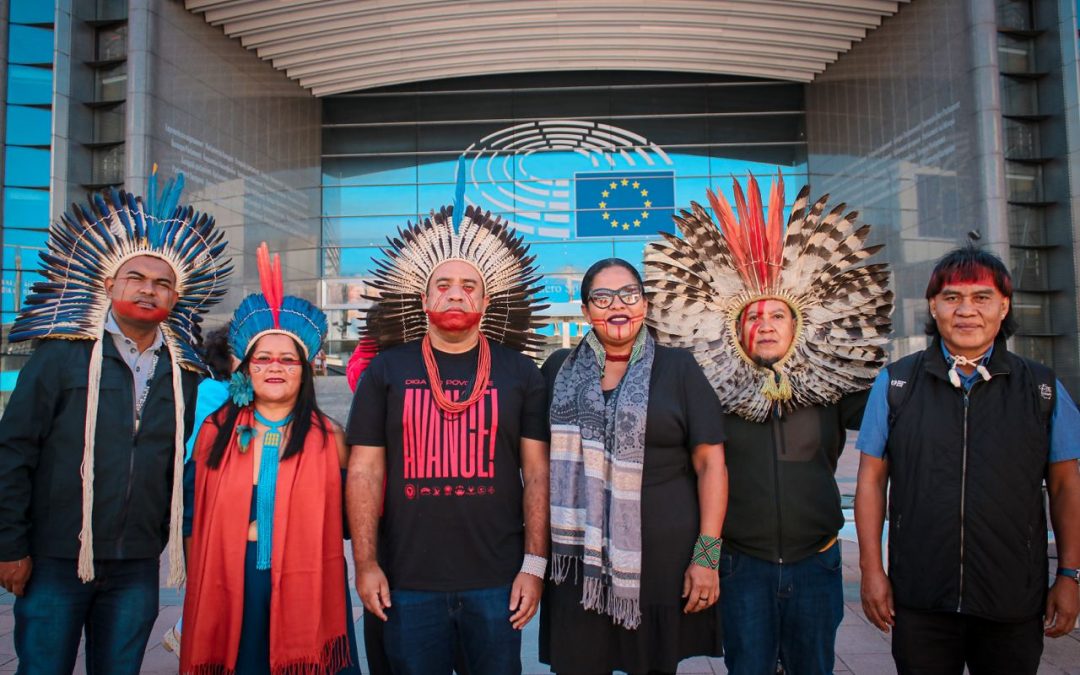The European Parliament voted yesterday, September 13th, on the draft law for Forest and ecosystem-risk commodities regulation (FERC). Among the results of the debate, the inclusion of respect for international agreements and treaties on the rights of indigenous peoples stands out, as APIB had been defending since the beginning of the proposal of this legislation. However, another of APIB’s main demands, which was the protection of all ecosystems, regardless of the definition of forest cover, was not included.
The FERC law, also known as the deforestation-free products law, will include measures that oblige companies producing commodities to respect international human rights legislation, which includes guaranteeing the rights of Indigenous Peoples. The Members of the European Parliament (MEPs), meeting yesterday (13) in Strasbourg, France, voted on the draft law and reviewed the suggested changes. Among the proposals accepted by the MEPs, there is the prerequisite that Indigenous Peoples have guaranteed access to free, prior and informed consultation on the production of commodities, as advocated by Convention No. 169 of the International Labor Organization (ILO). No product may be imported into the European Union without the responsible company obtaining the consent of the affected Indigenous Peoples to install a commodity production activity close to their lands.
Another of the accepted proposals was the revision of the law annually (every year), instead of every two years as was initially foreseen. MEPs did not give in to pressure from business lobbies and leather was included in the group of commodities regulated by the regulation for deforestation-free products. This implies a major victory, as leather is one of the main products potentially responsible for deforestation imported by the European Union. In addition to all commodities considered by the first law proposal -beef, palm oil, soy, wood, coffee and derivatives (such as chocolate and furniture)- the regulation voted today also considers the traceability of deforestation in the pork, sheep, goat and poultry meat, as well as corn, rubber and paper products.
The important role played by financiers of commodity production chains, was also considered. MEPs included regulation for European banks and investors to not finance deforestation and human rights violations.
The European Parliament is aware that the creation of a law for deforestation-free products in European Union countries will not end deforestation. Commodities with a forestry risk that can be sold in markets other than the European one. Then, the European Parliament proposes a cooperation program between countries to apply measures to stop forest destruction. The MEPs proposed that the European Commission be responsible for drawing up maps that identify countries with high deforestation risks, in order to support international cooperation programs. Likewise, they insisted on the need for good governance within the affected countries by deforestation, as well as the protection of the rights of Indigenous Peoples, traditional populations and other people who depend on nature.
Parliament requested assistance so that small producers can comply with the rules established by the FERC law, among which they highlight, for example, the need for geolocation traceability of products. It is fair and necessary to build partnership and cooperation programs to help small producers make a transition to sustainable agricultural and livestock production.
In addition, the legislation will include access to independent and impartial justice bodies to oversee the impacts of deforestation caused by commodity production, but only on an administrative basis. Companies cannot be directly prosecuted by penal or criminal law through the mechanisms established by FERC. Furthermore, the Euro-parliamentarians rejected the request to include in the anti-deforestation law the need for compensation mechanisms for Indigenous Peoples affected by commodity production chains.
“What this law needs is to be stricter in the traceability of these products. Indigenous Peoples are not looking for compensation, we want measures to avoid the impacts and, in case of illegalities, criminal prosecution for companies and not only administrative penalisations”, explains Dinamam Tuxá, APIB coordinator.
Another of the most important demands that was left out was the protection of all ecosystemes – regardless of the FAO definition of forests applied in the FERC law. “In addition to what this law recognized, we would like a much more ambitious regulation, recognizing and protecting other ecosystems for the guarantee and protection of these territories also under threat from the advance of agribusiness”, says Tuxá. “We understand that the non-recognition of other ecosystems within this law will put even more pressure on deforestation outside the Amazon forests. This brings us concern because these are productive areas that are already in a lot of conflict and that, in many places in Brazil, agribusiness have drastically advanced over indigenous territories”. Protecting only some natural areas opens a gap for commodity production chains to be moved from one region to another without solving the deforestation problem. APIB insists on the need to review this point in the coming months of debate before final approval of the text.
The result of the vote was the last step in the elaboration of the text of the FERC law which was presented to the European Parliament in November 2021. However, the legislation can still undergo changes, as a result of negotiations between the European Parliament, the European Council and the European Commission. This process, known as “trilogs”, aims to conclude a final version of the legislation by the end of the year 2022, approximately. Only after the final approval by all member states of the European Parliament, the law can come into force.

